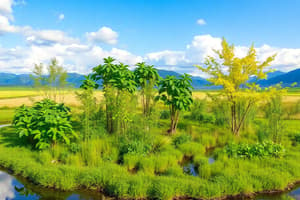Podcast
Questions and Answers
What do supporting services in an ecosystem primarily contribute to?
What do supporting services in an ecosystem primarily contribute to?
- Biodiversity preservation
- Climate regulation
- Maintenance of basic ecosystem processes (correct)
- Wildlife promotion
What is a significant challenge posed by our ignorance regarding ecosystems?
What is a significant challenge posed by our ignorance regarding ecosystems?
- Setting research priorities effectively (correct)
- Measuring all components of an ecosystem
- The ability to predict ecosystem behavior
- Understanding historical ecosystem changes
How can scientific knowledge help address environmental problems?
How can scientific knowledge help address environmental problems?
- Through the application of non-empirical methods
- By providing anecdotal evidence for policymaking
- By prioritizing individual preferences in environmental strategies
- By formulating testable solutions based on data (correct)
Which method is NOT typically used by scientists to investigate environmental questions?
Which method is NOT typically used by scientists to investigate environmental questions?
What characteristic of ecosystems complicates our ability to predict their behavior?
What characteristic of ecosystems complicates our ability to predict their behavior?
Which component of an ecosystem includes living organisms such as plants and animals?
Which component of an ecosystem includes living organisms such as plants and animals?
What principle states that energy cannot be created or destroyed in an ecosystem?
What principle states that energy cannot be created or destroyed in an ecosystem?
What type of feedback occurs when increased algal growth diminishes nutrients in an ecosystem?
What type of feedback occurs when increased algal growth diminishes nutrients in an ecosystem?
Which term describes the recycling of chemicals within ecosystems?
Which term describes the recycling of chemicals within ecosystems?
Which of the following is considered a provisioning service provided by ecosystems?
Which of the following is considered a provisioning service provided by ecosystems?
What happens to energy when it enters an ecosystem as solar radiation?
What happens to energy when it enters an ecosystem as solar radiation?
How do ecosystems primarily self-regulate their processes?
How do ecosystems primarily self-regulate their processes?
Which of the following best defines cultural services provided by ecosystems?
Which of the following best defines cultural services provided by ecosystems?
What is the primary focus of environmental science?
What is the primary focus of environmental science?
Why do environmental problems often present challenges in finding solutions?
Why do environmental problems often present challenges in finding solutions?
What does the concept of the triple bottom line (TBL) measure?
What does the concept of the triple bottom line (TBL) measure?
Which of the following actions is an example of sustainability?
Which of the following actions is an example of sustainability?
What is a significant social trap related to environmental decision-making?
What is a significant social trap related to environmental decision-making?
What is a key characteristic of ecosystems?
What is a key characteristic of ecosystems?
What role does controlling population size play in sustainability?
What role does controlling population size play in sustainability?
Which statement describes environmental science as an interdisciplinary field?
Which statement describes environmental science as an interdisciplinary field?
Flashcards are hidden until you start studying
Study Notes
Environment & Environmental Science
- Environment: The biological, chemical, and physical surroundings of any living organism.
- Environmental Science: Studies all aspects of the environment, drawing on natural and social sciences, and the humanities.
Environmental Problem Solving
- Challenges: Environmental problems are multifaceted and difficult to solve due to multiple causes and consequences, different stakeholders, and potential solutions with trade-offs.
- Triple Bottom Line (TBL): An accounting framework assessing environmental, social, and economic performance.
- Environmental (Planet): Measured by pollution, waste, energy use, and species conservation.
- Social (People): Human health, well-being, equity, access to resources, and community benefits.
- Economic (Profit): The traditional dimension of performance.
Sustainability & Ecosystem Services
- Sustainability: Meeting current needs equitably and fairly without compromising future generations' ability to meet their needs.
- Examples: Renewable energy, recycling, population control, and local biodiversity preservation.
- Ecosystem Services: Resources and processes ecosystems provide to humans.
- Provisioning Services: Food, water, air.
- Regulating Services: Climate control, water flow, pollutant absorption.
- Cultural Services: Spiritual and recreational benefits.
- Supporting Services: Nutrient cycles, soil formation.
Ecosystem Dynamics & Uncertainty
- Ecosystems: Complex assemblages of interacting biotic and abiotic components.
- Biotic: Living organisms (plants, animals, bacteria).
- Abiotic: Nonliving components (water, temperature, minerals).
- Processes: Photosynthesis, water cycle, carbon and nitrogen cycles.
- Ecosystem Function Principles:
- Matter and energy are neither created nor destroyed.
- Ecosystems are open to energy and matter exchange.
- Processes are self-regulated.
- Change is essential and inevitable.
- Uncertainty: Ignorance and complexity make ecosystem understanding challenging.
- Complexity: Small changes can lead to large differences in complex systems.
- Measuring and understanding all interacting components is near impossible.
Scientific Thinking & Environmental Solutions
- Science: A body of knowledge about the natural world and the process used to acquire that knowledge.
- Empirical Evidence: Observations and data that can be tested and validated.
- Role of Science:
- Understand causes of environmental issues.
- Test and evaluate solutions.
- Guide policymaking with scientific evidence.
- Scientific Methods: Systematic questioning, hypothesis testing, replication, peer review, and openness to new technologies and ideas.
Studying That Suits You
Use AI to generate personalized quizzes and flashcards to suit your learning preferences.




